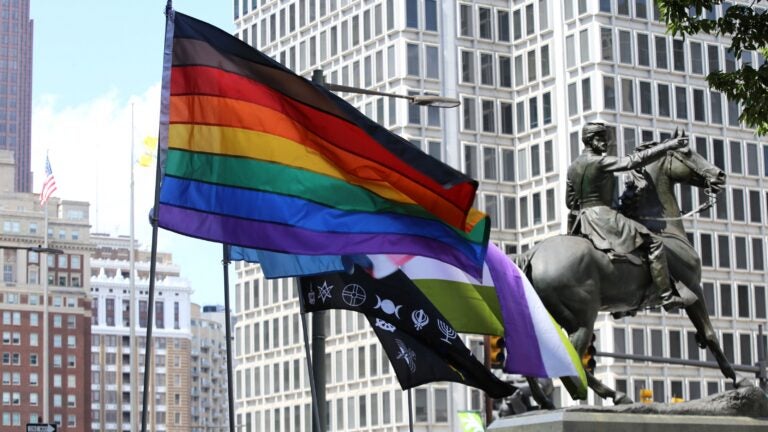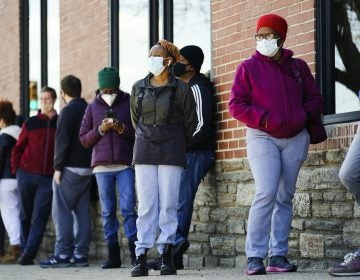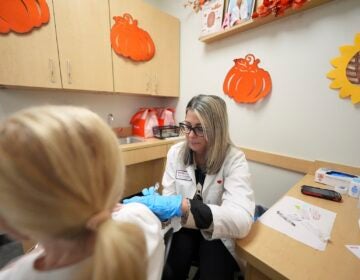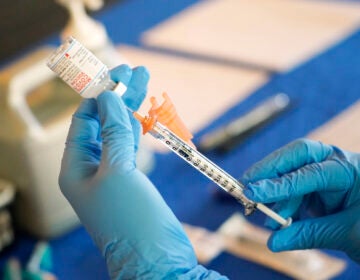LGBTQ Pennsylvanians could have less COVID-19 vaccine access, more hesitancy
Health disparities and lack of competent care could make LGBTQ Pennsylvanians more hesitant about the vaccine. A survey is underway.

An LGBTQ pride flag is pictured in Philadelphia. (Samantha Madera/City of Philadelphia)
Ask us about COVID-19: What questions do you have about the coronavirus and vaccines?
To reach herd immunity, 70% to 80% of eligible U.S. residents will need to be vaccinated against COVID-19. Various surveys have been conducted on vaccine hesitancy, but one group that’s still missing from the data? LGBTQ communities.
In Pennsylvania, researchers are hoping to change that.
The Pennsylvania LGBTQ COVID-19 Vaccine Survey is part of a study led by Kat Carrick, adjunct professor of social work at Bryn Mawr College’s Graduate School of Social Work, in partnership with the Bradbury-Sullivan LGBT Community Center in Allentown. The goal is to collect data about vaccine hesitancy and potential barriers to care for Pennsylvania’s LGBTQ residents.
“There’s well-documented health disparities in the LGBT community in terms of not disclosing to doctors, not feeling comfortable with providers, and not feeling comfortable with health insurance, having lower incomes across the board, having more likelihood of not being insured,” Carrick told WHYY News.
The study is the first of its kind to conduct a statewide survey of LGBTQ residents and ask about their willingness to get the COVID-19 vaccine. It’s roughly based on a small pilot study in Boulder County, Colorado, that indicated that people who identify as LGBTQ were more hesitant to get the vaccine than straight people were.
After recording and analyzing the Pennsylvania survey data, Carrick said, her team will report their findings to the governor’s office, where it could shape policy around vaccine allocation and distribution in the commonwealth.
They will also distribute their findings to partner organizations, including William Way LGBT Community Center in Philadelphia, Hugh Lane Wellness Foundation in Pittsburgh, LGBT Center of Central PA in Harrisburg, Alder Health Services in Harrisburg, Rainbow Rose Center in York, LGBT Center of Greater Reading in Reading, and Mosaic Medical Center in Chester.
“State and federal vaccine tracking systems are not measuring the LGBTQ community. We need to know if our community is willing to receive the vaccine or not — and, if not, what barriers are in the way,” Adrian Shanker, executive director of the Bradbury-Sullivan center and a collaborating investigator on the study, said in a statement.
“This survey is essential in getting that information and keeping our communities safe from COVID-19,” Shanker said.
The survey has been spread primarily through social media and word-of-mouth advertising, which is also new for Carrick. Both she and Shanker are well-established activists in the LGBTQ community, which means they’ve been using their personal and professional networks to get the word out. So far, they’ve received over 1,500 survey responses.
“It’s a pretty healthy sample size,” Carrick said. “It’s not representative of the whole of LGBT community in the state of Pennsylvania, but it will give us enough information in terms of how many people are planning on being vaccinated, how many people [already have] a vaccine … It will at least give us a baseline of information.”
LGBTQ Pennsylvania residents who are 18 and older are invited to participate in the confidential survey, which is accepting responses until April 1.

Get daily updates from WHYY News!
WHYY is your source for fact-based, in-depth journalism and information. As a nonprofit organization, we rely on financial support from readers like you. Please give today.




![CoronavirusPandemic_1024x512[1]](https://whyy.org/wp-content/uploads/2020/03/CoronavirusPandemic_1024x5121-300x150.jpg)




